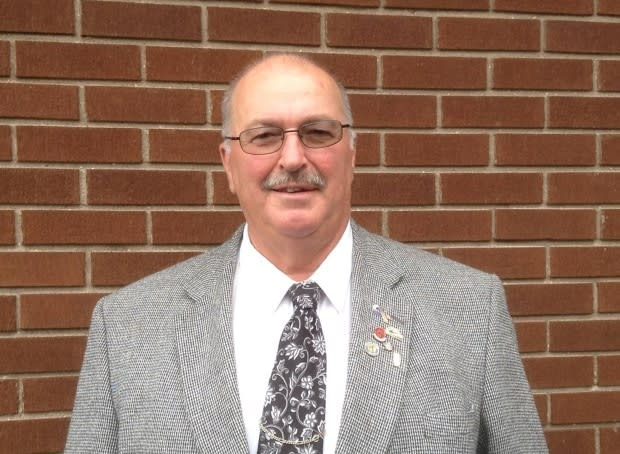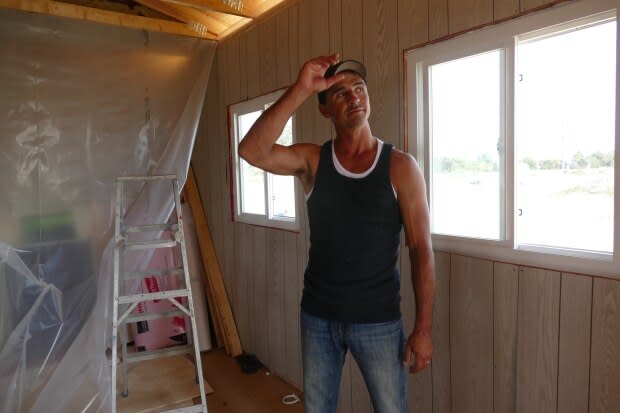Ontario police services board calls Six Nations members halting housing development 'terrorists'
A southern Ontario police services board is calling on the Ontario Provincial Police to arrest an NDP MP and take action against what it calls "acts of terrorism" committed by members of Six Nations who halted a housing development in Caledonia, Ont.
Members of Six Nations have been occupying the McKenzie Meadows housing development, known as 1492 Landback Lane, for over two months despite an injunction extended by an Ontario court in August.
Caledonia is about 20 kilometres south of Hamilton and next to the Six Nations reserve, which has the largest population of any First Nation in the country with over 27,200 members.
The parcel of land in question is part of a case before the Ontario Superior Court filed by Six Nations in 1995 against the provincial and federal government over the illegal dispossession of Six Nations lands and trust monies. A trial is scheduled for October 2022.
Bernie Corbett is chair of the Haldimand County police services board and a long-time councillor for Haldimand County, which oversees Caledonia. He said he and Haldimand County residents are "fed up" with the stalemate that remains on the parcel, despite an Ontario judge recently extending an injunction barring people from crossing onto the property.
Corbett said he was particularly perturbed by Hamilton Centre NDP MP Matthew Green's visit last week to the site. He said the OPP should have arrested Green on site.
"In my estimation he trespassed, he should have been arrested because a judge's order was issued. Those people should not be there, it's private property," said Corbett.
"[Green] is not immune to that type of situation and it concerns me he went out there... He bad-mouthed the community, the OPP and the federal government. That exacerbated the problem."

The OPP did not respond to a request for comment. Over two dozen people have been arrested at the site so far allegedly defying the injunction.
'Acts of terrorism'
The Haldimand County police board also aired its grievances with the OPP during a public meeting Wednesday that was attended by the OPP's West Region Commander John Cain, who is in charge of overseeing policing of the site.
"These people who claim to be peaceful Aboriginals and only want to take alleged Aboriginal land have crossed a line," said a position document prepared for the meeting by the police board.
"They have openly disobeyed orders of the court. They have committed acts of aggression and intimidation which by Canadian Criminal Code definition are acts of terrorism. These Aboriginals are not protesters, they are now by legal definition terrorists."
Green said the police board's statements were racist and examples of "anti-Indigenous colonial violence." Green said the police board represented only the views of the "far-right" in Haldimand County.
"If I was Indigenous, hearing these statements by the chair of this police board, I would fear for my safety at the hands of police as I leave the territory," said Green.
"Not only are the comments racism, they are targeted and they are meant to incite violence against Indigenous people... If there was a line to be crossed, it would be the line of human rights and the code of conduct related to both elected officials of the municipality and the police services board."

In the document, the Haldimand County police board also singled out Skyler Williams, who has acted as a spokesperson for 1492 Landback Lane, mentioning reports of his involvement in incidents during the 2006 conflict over a separate housing development in Caledonia known as Douglas Creek Estates, which subsided after the province bought the land.
A statement issued by members of 1492 Landback Lane said "The board is violently racist, viewing Indigenous lives as barriers to corporate profit. Their statements amount to calls for police to target our community and Skyler Williams in particular which is a threat that is intolerable to our community."
The statement also called for the police board's resignation.
'Rule of law'
Police board vice-chair Brian Haggith, a former OPP inspector who retired in 2014, said he believes the OPP's approach to Indigenous policing — which follows recommendations from the Ipperwash inquiry called after the 1995 shooting of Dudley George during the occupation of Ipperwash provincial park — is broken.
Haggith, who was one of the incident commanders when the 2006 Caledonia conflict flared, said there needs to be a third-party review of the Ipperwash framework which should lead to an overhaul.
"I understand that Canada has 400 years of history… and I understand they have viable land claims, everybody does... We have a system in our democracy and our democracy is based on the rule of law and that is how we all get along," he said.
"These people, if they have a bona fide, legitimate land claim they should, like every other person, take that matter to the court... If they have a strong enough case, the courts could order a stop to construction until the matter is settled."
Haggith said ultimately it's the federal government's failure to deal with outstanding land claims that has created a cyclically volatile situation in the region.

Crown-Indigenous Relations Minister Carolyn Bennett and Indigenous Services Minister Marc Miller have offered to meet with the Six Nations band council and the Haudenosaunee Confederacy, but no meeting has yet been set.
"We believe the best way to resolve outstanding issues is through a respectful and collaborative dialogue, which is vital to building stronger relationships and advancing reconciliation," said a statement from Bennett's office.
"Canada deeply values its relationship with Six Nations and is committed to continuing to work collaboratively to address Six Nations' historical claims and land right issues. We are actively working with the community and look forward to meeting at the earliest opportunity."
Land sold to squatters in 1800s
The site, at 1535 McKenzie Road, was once known as Lot 3 and part of the Haldimand Tract, which was granted to the Haudenosaunee of Six Nations of the Grand River in 1784 for allying with the British during the American Revolution.
Lot 3 was sold between settlers during a period of widespread squatting on Six Nations land, leading to complaints to the colonial authorities. In 1844, the colonial authority, through its Indian Office in Kingston, issued a public notice announcing squatters were "required forthwith to remove from said tract."
However, the colonial authorities sold 11.5 acres of Lot 3 to a man named Thomas Nicholas in 1845 for $506.25. Nicholas had in turn previously purchased the land from a squatter named George Bryant, who declared squatters rights to the plot, according to a recent research report by the Haudenosaunee Confederacy Chiefs Council, the traditional governing body of Six Nations. The sale was finalized in 1853, past the 1851 due date for the instalment plan that was part of the deal, according to the research.
"Thus rendering the sale useless," according to the confederacy research report.
"The Haudenosaunee did not benefit from the proceeds of this sale. Crown patents were being issued by the Crown unilaterally, thus creating their own registry base. They stole it fair and square."

Skyler Williams said he sees the police services board statements and documents as a "direct threat" to his personal safety.
"It is certainly worrisome for my kids and certainly for my wife, so yes, I'm concerned," said Williams.
"I hope it's just ignorance. I generally hope they just don't know about the history of this land... It's hard to live in a world where someone would hate you because of the colour of your skin, because of where you come from, because you're on the wrong side of the tracks."
Williams said Six Nations is being hemmed in by developments on land that has been stolen and the community cannot expand due to the bureaucratic obstacles to adding new lands to reserves. Williams said the community can't rely on the land claims process or the courts because it takes decades for anything resembling movement to occur.
"To say these 40-year-old land claims processes that in my opinion are broken [are] the only path forward, then this is going to continue to happen, like it's happening across the country," said Williams.


